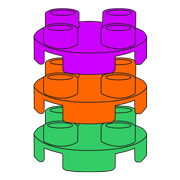Corso Systems’ Ignition Exchange Resources
Corso Systems set a huge precedent at the Ignition Community Conference in 2019 when Inductive Automation announced the Ignition Exchange. Because, that’s also when we had the honor of releasing the very first public Ignition Exchange Resource. That resource was our own Ignition implementation of the Rockwell Automation PlantPAX Framework, FactoryPacks by Corso Systems Engineer, William Bohn.
Since 2019, the Corso Systems team has released many more Ignition Exchange resources. These resources include some amazing creations from Andrew Geiger such as Metatools which exposes powerful functionality in Ignition including logging Python Performance, Pretty Printing, and an extremely robust caching engine which speeds up data access on large scale Ignition systems. Metatools received an honorable mention in the Ignition Exchange Challenge at ICC 2020.
Andrew also released the Canary Labs API - Birdsong resource which exposes the Canary Labs API directly in Ignition and simplifies the process of integrating Canary Labs Historians with Ignition.
Corso Systems Founder and CEO, Alex Marcy has even thrown his hat into the Ignition Exchange with the Geofence resource. This was a featured resource from ICC 2021, and is great for Geolocation tracking using the Ignition Perspective App. Alex has also released a few other resources built on top of Slack that are deprecated due to changes in the Slack infrastructure since their original release.
New Corso Systems Ignition Exchange Resource: Plastic ORM
We are super excited to announce our newest Ignition Exchange resource, the Plastic ORM Tool by Corso Systems Engineers, Emily Liu and Andrew Geiger.
ORM stands for Object Relational Mapping. ORM is a common tool in the technology world and basically it makes life immensely easier when interacting with databases.
An ORM tool lets you create objects in code and exposes the various database fields as properties on the object. This makes it really easy to read and write data to the database, manage objects in your code, and build complex systems without a lot of effort.
If you use platforms like .NET or Ruby on Rails, ORM tools are one of the first things you learn when using databases and you can even build database user interfaces using “scaffolding”. This is where the ORM reads in your database schema and outputs forms and pages with the correct fields for creating, reading, updating and deleting data, otherwise referred to as CRUD.
As Alex Marcy stated in a post on LinkedIn announcing the Plastic ORM for Ignition:
“Coming from web development tools early in my career this was the one thing I always wanted most in Ignition and never got around to developing more than a proof of concept.
I’d say Plastic ORM is one of the most impactful and powerful tools in any Ignition developer’s toolkit! I’d say it is as big of a game changer as Perspective!”
Please check out all of the Corso Systems resources on the Ignition Exchange, and if there is anything you would like to see that we haven’t yet created please reach out and let us know!




